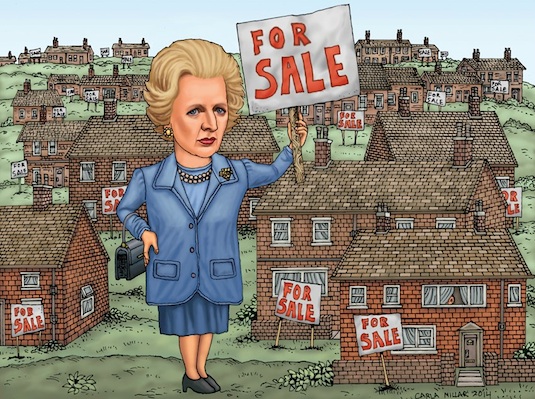
Unfortunately, what might have been a very interesting contribution is ducked for banal strawmanning. Mark suggests that Corbynism's view of how Thatcher won elections is entirely wrong. Having done well earlier this year and variously held poll leads since, he suggests the left believes we can win and win again by eschewing the soggy centre and go full bore on a socialist programme. After all, Thatcher did the same from the right, didn't she? "Aha!", says Mark in his best Alan Partridge voice, "that is not what happened at all!" In the first place the Tories then made much hay out of Labour incompetence, and tacked toward the centre with dovish 'all in it together' language. As Mark rightly notes, "appealing to voters on the grounds where they are, rather than striking off in a completely different direction, are what won it for Margaret Thatcher in 1979."
I think Mark's spent too much time with Progress editorials. There's a bit of 'one more heave' knockabout on Twitter, but no one really thinks winning an election is going to be as easy as that. What Thatcher's Tories did was advance a programme from the right toward the centre, which won her the election. This was a trick Theresa May was also supposed to pull off, but utterly failed to do so. Meanwhile, far from eschewing the Thatcherite play book the Corbyn-led Labour Party reached toward the centre from the left. It did not say nationalise things because communism. Instead, the party broke with received orthodoxy and set about forging a new consensus based on a common sense branding of its policies Labour itself defined. Thatcher talked about the nation coming together to, um, make Britain great again. Likewise Corbyn staked the party's programme around 'the many' and not 'the few'. Both pointed to the shambles their opponents were in and were able to exploit them. The key difference between the 1979 and 2017 elections is 1979 marked and end to the post-war political duopoly, 2017 looks like the beginnings of its resumption.
What Labour needs to do next is, well, build on its recent consensus-building accomplishments, not what Mark thinks it's been doing. As Stuart Hall argued in his masterful commentaries on Thatcherism, the groundwork for a political shift to the right was performed sometimes in concert, sometimes independently by movements and organisations that pushed a bit of conservative common sense here, or framed a political issue there. The National Front, for instance, played its role demonising immigrants and pushing this issue to the right, which Thatcher then appropriated. The Festival of Light at the beginning of the 1970s and its armies of evangelising moral crusaders helped cultivate a mass current against the permissive society, which the Tories tapped into. The easy populism of monetarism vis a vis a Labour Party beset by crisis management helped shift the common sense view of economics away from full employment toward so-called sound money, and so on. Our counterweight to the Tories now is not as advanced or refined, but already Labour's programme speaks to the life experiences of millions of people. As each day passes more Labour voters are added to the electoral rolls. This must be and is being deepened as the mass of the Labour Party provides real social weight. For millions of people, Labour's emerging common sense has a face, a name, a personal connection attached to a policy agenda. To counter the Tory advantage in the media, its people power is harnessing social networks to draw people in and give them a sense of belonging. And with the broken policy consensus, through its own spokespeople Corbynist ideas are charging into the media, getting mulled over, pulling masses of people into political conversation. All the while, while Labour and socialist ideas are being reborn via political recomposition, the Tories are dropping to bits. They're decomposing and their politics haunted by phantoms. The material base for a Tory Thatcherite strategy just isn't there. They're knackered.
The question for Mark and the LibDems is not to look on with bemusement, but to figure out how they can stay afloat during the political squeeze. Rebranding as Remainia Central hasn't got much to show for it, so what to do?
Yes, the Festival of Light and the moral crusaders. Where did their money come from?
ReplyDeletePray tell.
Delete